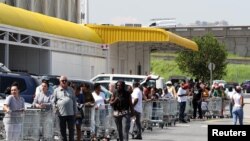South Africa's 21-day lockdown could be the biggest challenge the nation has faced in decades, the country's president warned as he announced the harsh measure Monday night.
On Tuesday, top officials sought to explain the lockdown and justify the need for strong action as the nation sees a large rise in cases of the highly contagious coronavirus.
As if to underscore the gravity of the situation as the nation scrambled to prepare Tuesday, Health Minister Zweli Mkhize noted that the caseload had risen by more than 100 cases overnight, and that two patients had gone into critical care.
Meaning the lockdown, which begins late Thursday night, is necessary, Mkhize said.
"Our strategy, we said, has to be about flattening the curve," he said. "In other words, we allow the infection to be drawn out in such a way that we get as few people infected as possible so that it does not grow so rampantly as to overwhelm our health services. In that way, we have to behave or take certain decisions that will make it more easier for us to manage it and more difficult for it to spread."
Health officials have estimated that hundreds of thousands of South Africans could be infected if the coronavirus is allowed to run rampant. The nation already has the world's highest burden of HIV, meaning millions of South Africans are already prone to opportunistic illness.
The government has also brought in the national army to support the lockdown by limiting movement. On Monday, the day the lockdown was announced, soldiers were seen on main roads in Johannesburg, the nation's largest city.
People found in violation of the lockdown could face a fine or one month's imprisonment. However, officials assured panicked South Africans that essential businesses such as pharmacies, laboratories, banks, the stock exchange and financial organizations, supermarkets and gas stations will remain open, and health care providers will be available.
Mkhize, a physician, then prescribed his nation a bitter pill: patience.
"The numbers, we mustn't be shocked when we see them increase," he said. "But these measures, if we all work together, must turn the curve around. But it won't happen tomorrow. It won't happen next week. If there's any change, it will probably take us a couple of weeks before we can see a turnaround."
On that note, he said, Good Friday and Easter — usually a highlight of the South African calendar, celebrated with great fanfare in April — were canceled this year.









